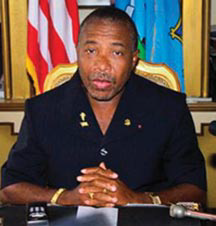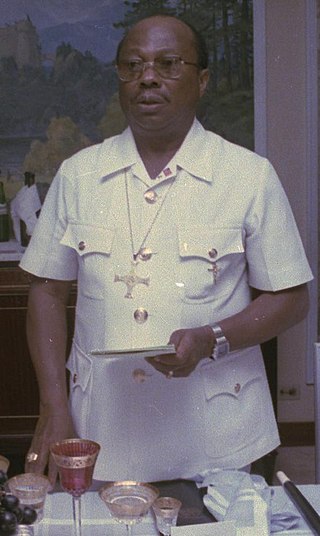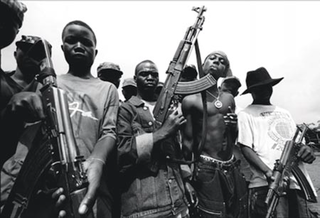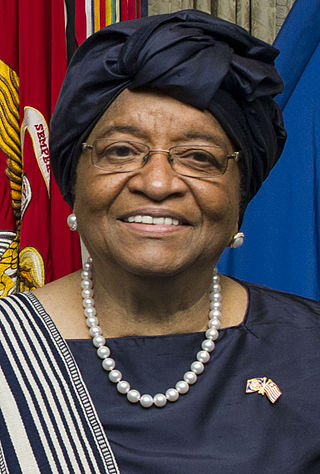| |||||
| Decades: | |||||
|---|---|---|---|---|---|
| See also: | |||||
The following lists events that happened during 1849 in Liberia .
| |||||
| Decades: | |||||
|---|---|---|---|---|---|
| See also: | |||||
The following lists events that happened during 1849 in Liberia .

Liberia, officially the Republic of Liberia, is a country on the West African coast. It is bordered by Sierra Leone to its northwest, Guinea to its north, Ivory Coast to its east, and the Atlantic Ocean to its south and southwest. It has a population of around 5.5 million and covers an area of 43,000 square miles (111,369 km2). The official language is English. Over 20 indigenous languages are spoken, reflecting the country's ethnic and cultural diversity. The capital and largest city is Monrovia.

Liberia is a country in West Africa founded by free people of color from the United States. The emigration of African Americans, both freeborn and recently emancipated, was funded and organized by the American Colonization Society (ACS). The mortality rate of these settlers was the highest among settlements reported with modern recordkeeping. Of the 4,571 emigrants who arrived in Liberia between 1820 and 1843, only 1,819 survived (39.8%).

The Politics of Liberia takes place in a framework of a presidential representative democratic republic modeled on the government of the United States, whereby the president is the head of state and head of government; unlike the United States, however, Liberia is a unitary state as opposed to a federation and has a pluriform multi-party system rather than the two-party system that characterizes US politics. Executive power is exercised by the government. Legislative power is vested in both the government and the two chambers of the legislature.

Charles McArthur Ghankay Taylor is a Liberian former politician and convicted war criminal who served as the 22nd president of Liberia from 2 August 1997 until his resignation on 11 August 2003 as a result of the Second Liberian Civil War and growing international pressure.

Samuel Kanyon Doe was a Liberian politician and military officer who served as the 21st President of Liberia from 1986 to 1990. He ruled Liberia as Chairman of the People's Redemption Council (PRC) from 1980 to 1986 and then as president from 1986 to 1990.

The president of the Republic of Liberia is the head of state and government of Liberia. The president serves as the leader of the executive branch and as commander-in-chief of the Armed Forces of Liberia.

William Richard Tolbert Jr. was a Liberian politician who served as the 20th president of Liberia from 1971 until his assassination in 1980.

Monrovia is the administrative capital and largest city of Liberia. Founded in 1822, it is located on Cape Mesurado on the Atlantic coast and as of the 2022 census had 1,761,032 residents, home to 33.5% of Liberia’s total population. Its largely urbanized metro area, including Montserrado and Margibi counties, was home to 2,225,911 inhabitants as of the 2022 census.

George Tawlon Manneh Oppong Ousman Weah is a Liberian politician and former professional footballer who served as the 25th president of Liberia from 2018 to 2024. Before his election for the presidency, Weah served as senator from Montserrado County. He played as a striker in his prolific 18-year professional football career which ended in 2003. Weah is the first African former professional footballer to become a head of state, and the only African Ballon d’Or and FIFA World Player of the Year winner in history, winning both awards in 1995. He won the African footballer of the year 3 times and is widely considered one of the greatest strikers of all time.

Charles Dunbar Burgess King was a Liberian politician who served as the 17th president of Liberia from 1920 to 1930. He was of Americo-Liberian and Sierra Leone Creole descent. He was a member of the True Whig Party, which ruled the country from 1878 until 1980.

The First Liberian Civil War was the first of two civil wars within the West African nation of Liberia which lasted between 1989 and 1997. President Samuel Doe's regime of totalitarianism and widespread corruption led to calls for withdrawal of the support of the United States, by the late 1980s. The National Patriotic Front of Liberia (NPFL) led by Charles Taylor invaded Liberia from the Ivory Coast to overthrow Doe in December 1989 and gained control over most of the country within a year. Doe was captured and executed by the Independent National Patriotic Front of Liberia (INPFL), a splinter faction of the NPFL led by Prince Johnson, in September 1990. The NPFL and INPFL fought each other for control of the capital city, Monrovia and against the Armed Forces of Liberia and pro-Doe United Liberation Movement of Liberia for Democracy. Peace negotiations and foreign involvement led to a ceasefire in 1995 but fighting continued until a peace agreement between the main factions occurred in August 1996. Taylor was elected President of Liberia following the 1997 Liberian general election and entered office in August of the same year.

The Second Liberian Civil War was a civil war in the West African nation of Liberia that lasted from 1999 to 2003.

Ellen Johnson Sirleaf is a Liberian politician who served as the 24th president of Liberia from 2006 to 2018. Sirleaf was the first elected female head of state in Africa.

The Legislature of Liberia is the bicameral legislature of the government of Liberia. It consists of a Senate – the upper house, and a House of Representatives – the lower house, modeled after the United States Congress. Sessions are held at the Capitol Building in Monrovia. Legislature of Liberia is considered one of the three branches of government based on the Article III of the Constitution of Liberia that stipulates all three branches ought to be equal and coordinated based on the Principle of checks and balances.

The vice president of the Republic of Liberia is the second-highest executive official in Liberia, and one of only two elected executive offices along with the president. The vice president is elected on the same ticket with the president to a six-year term. In the event of the death, resignation or removal of the president, the vice president ascends to the presidency, and holds the position for the remainder of their predecessor's term. The vice president also serves as the president of the Senate and may cast a vote in the event of a tie. The current vice president is Jeremiah Koung, serving under president Joseph Boakai. He began his term on January 22, 2024.

Liberia – United States relations are bilateral relations between Liberia and the United States. The two countries shared a close relationship until the 1970s.

Liberia is divided into fifteen first-level administrative divisions called counties, which, in turn, are subdivided into a total of 90 second-level administrative divisions called districts and further subdivided into third-level administrative divisions called clans.

The 1980 Liberian coup d'état happened on April 12, 1980, when President William Tolbert was overthrown and murdered in a violent coup. The coup was staged by an indigenous Liberian faction of the Armed Forces of Liberia (AFL) under the command of Master Sergeant Samuel Doe. Following a period of transition, Doe ruled Liberia throughout the 1980s until his murder in 1990 during the First Liberian Civil War.

Americo-Liberian people, are a Liberian ethnic group of African American, Afro-Caribbean, and liberated African origin. Americo-Liberians trace their ancestry to free-born and formerly enslaved African Americans who emigrated in the 19th century to become the founders of the state of Liberia. They identified themselves as Americo-Liberians.
The COVID-19 pandemic in Liberia was a part of the ongoing worldwide pandemic of coronavirus disease 2019 caused by severe acute respiratory syndrome coronavirus 2. The virus was confirmed to have reached Liberia in March 2020.